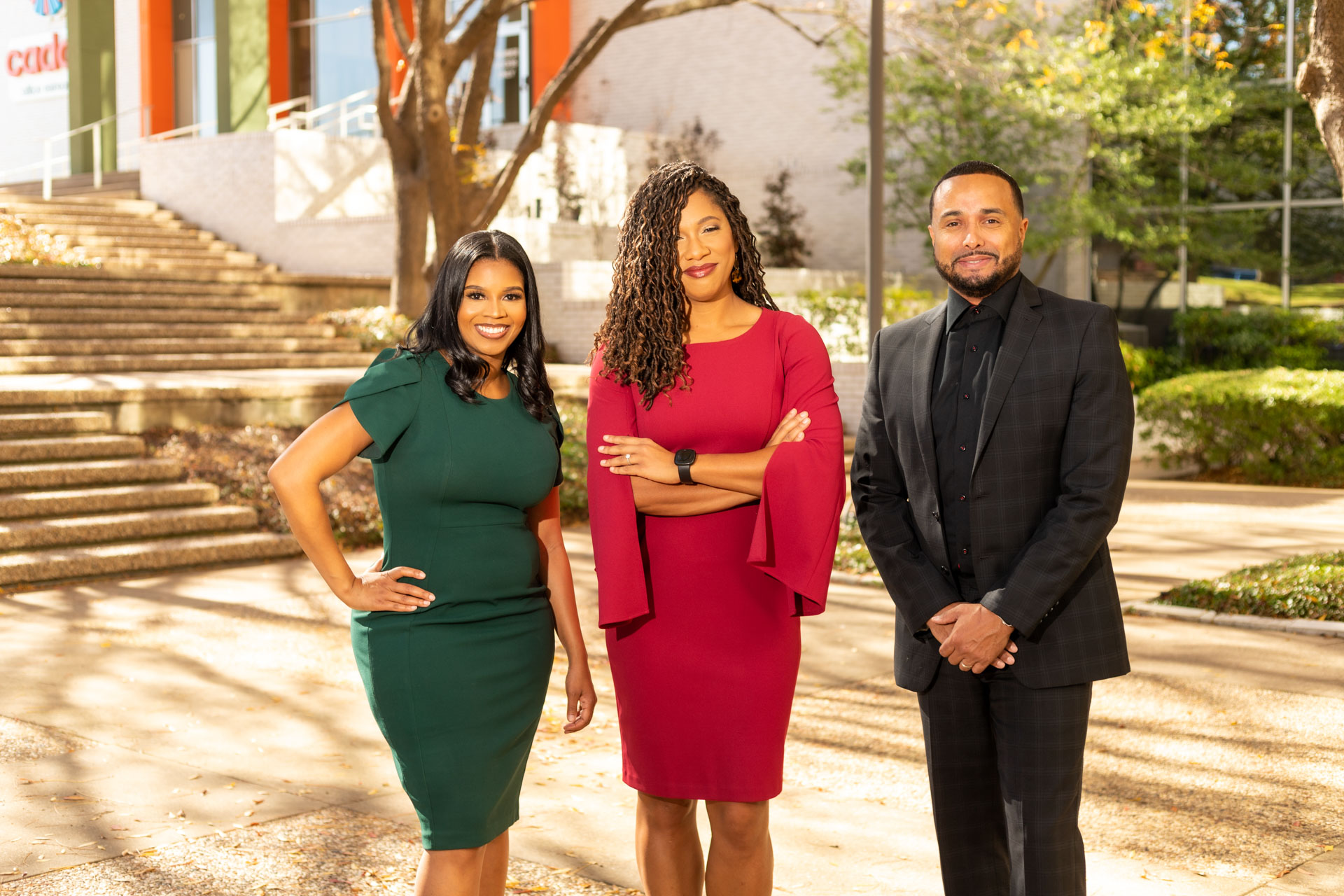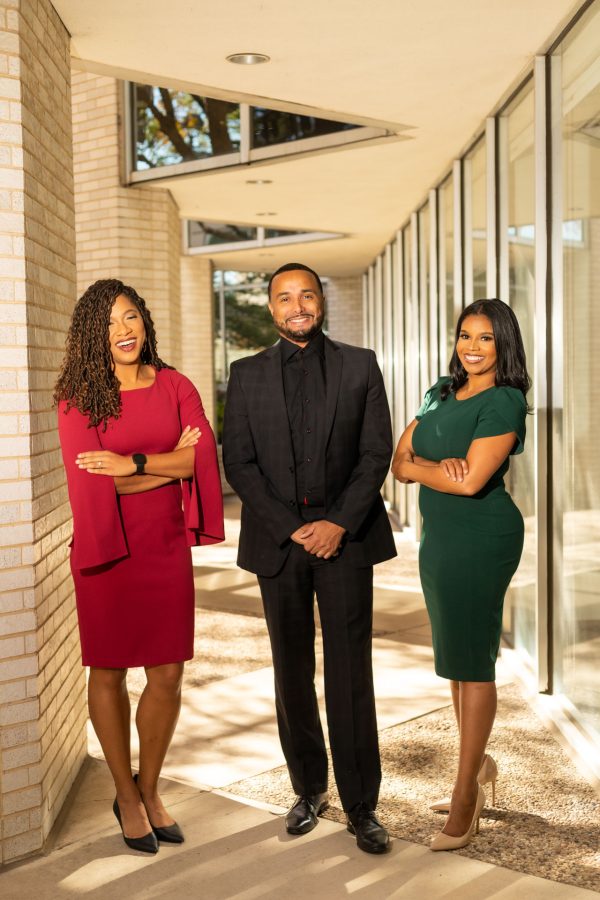
Mandy Price, Star Carter and Bennie King, the co-founders of Kanarys. Photography by Jessica Turner.
Photography by Jessica Turner.
Star Carter lives in the heart of Lakewood. She loves watching her kids play soccer and taking the kids fossil-digging with her husband, a geologist. A new neighbor recently moved in, so the Carters dropped off a welcome gift. They love sitting on the porch and talking.
“I just love that kind of family feel that you have in this neighborhood,” she says.
Her husband bought the Lakewood Hills home before they married. Carter owned a Deep Ellum townhome when she was single and still working at a law firm. When they married, they decided to live in our neighborhood.
Around the corner, her friends Mandy Price and Bennie King live with their daughter and son. King loves Upper Greenville because it reminds him of Austin, where he used to live.
All three friends grew up in the Dallas area: Price in DeSoto, Carter in Plano and King in Dallas. The three started as freshmen at the University of Texas in staggered years: Price in 1999, Carter in 2000 and King in 2001.
They hadn’t met each other yet.
Dreams of being a hot-shot New York City private equity lawyer died once Price realized she was a Texas girl through and through. She liked the South’s Novembers, when she could wear flip-flops. She loved being near family. Plus, Dallas is an established financial city where she could broker private equity at a big law firm.
Twenty years later, the three friends operate Kanarys, a 3-year-old tech firm centered on diversity, equity and inclusion (DEI) that has broken funding records and had incredible growth.
DEI is a hot topic these days. Even the City of Dallas hired a consulting firm to assess and improve how city hall decisions affect marginalized communities. Most consultants work with companies to address diversity and cultural issues by using anecdotal evidence and basic demographic data.
Kanarys helps companies address the same issues, but with a significant technical twist: Kanarys’ proprietary software analyzes a company’s demographic data, industry rankings and trends, along with anonymous employee reviews, to help unearth equity issues. The findings collected are presented in a company dashboard, and Kanarys helps devise plans to shift culture.
“We started Kanarys based on our individual experiences,” Price says. “We’re really working to ensure that we’re creating a workplace, no matter someone’s identity, that they are able to succeed within that organization.”
“I started thinking that I didn’t want my children to have to be prepared in the same way.”
Price and Carter qualified for a scholarship program that provides full rides to UT students whose families don’t qualify for federal aid but aren’t wealthy enough to pay for college. To foster a sense of community for the recipients, the program hosts picnics, dinners and other events. That’s when Price and Carter, a marketing major, developed their friendship.
Price, a finance major, was running for student body president when biology major King decided to join her campaign team. That’s when their friendship developed.
While Price and Carter were earning law degrees from Harvard, King started working at a pharmaceutical company that made plasma-based vaccines. Halfway through his career, King switched to the company’s compliance side and dealt with privacy and data security.
King was still living in Austin when he came to Dallas for a wedding Price was attending. They had remained friends for 20 years, but King thought there could be more. He asked a mutual friend if he’d put in a good word with Price.
“He was like ‘Absolutely not, it’s a terrible idea,” King says. “Both of you are my friends, and I do not support it at all.”
King texted Price anyway and asked if she’d like to hang out.
“That was the beginning of us,” he says. “Now, he [the friend] loves us together.”
By fall 2008, King proposed to Price. In the process of planning a destination wedding, they kept running into obstacles finding a venue. That led to King’s next career move.
King, who was a front-end manager of a nightclub and did some event planning while in college, knew most of the venue owners in Austin. He launched VenueCenter, a locating service.
King and Price lived in North Oak Cliff when they first married. After deciding to start a family, they moved to Lakewood. They now have a 6-year-old and a 4-year-old.
In 2018, King sold VenueCenter in a private transaction.
Right about that time, Price approached King and Carter about an idea she had: Kanarys.
“It became a rallying cry by corporations and CEOs and executive leaders.”

As Price worked on the Innocence Project and Harvard Civil Rights-Civil Liberties Law Review, she witnessed racist and sexist incidents on campus.
“There’s just so many things. It’s hard to say that there’s one thing to point to,” Price says. “The pivotal moment for me as far as Kanarys goes was not one incident, but the quantity of them.”
As a partner at a big law firm, Price would ignore microaggressions while helping others navigate similar inequitable corporate issues.
“I started thinking that I didn’t want my children to have to be prepared in the same way,” Price says. “And I didn’t want to keep teaching these kinds of skills, when we could actually make the systems themselves better.”
By that point, Price and Carter were working at the same law firm, even sharing an office. They swapped stories about the inequities they were experiencing and observing.
Carter says her partnership promotion was delayed because she took maternity leave. After pitching and acquiring clients, she says she was sometimes removed from working the clients’ file. She felt like others were taking credit for her work.
“We talked about how we really needed to look at these inequities and help organizations, in a way, understand those experiences, their underrepresented employees, and also understand their systems, policies, procedures and practices,” Carter says.
The best way to solve equity in a corporate world is data.
“Any other business unit within a company develops KPIs [key performance indicators],” King says.
After spending more than a decade facilitating mergers and acquisitions, Price saw that companies’ business priorities rarely aligned with DEI. The taboo of discussing DEI didn’t help.
“Everyone automatically relates it back to personal experiences,” King says. “But if we have data to back that up and say, “Hey, you know, you may have had the best of intentions, but this is what your employees are experiencing when it comes to XYZ.”
Increasing diversity and inclusion have always been a passion of Price and Carter. In college, Carter was the president of NAACP student chapter, and she chaired the diversity committee when she worked in law. Price was appointed to the Task Force on Racial Respect and Fairness by UT’s president and also served on her law firm’s diversity committee.
Price also served on the board of a nonprofit organization dedicated to advocating for employees. Price says she and other people of color resigned from the board.
“I was feeling like, “Wow, if this is something that is happening with this group that is advocating for employees, then how much more difficult it is for corporations and other groups to tackle these issues,” she says.
They started developing the idea for Kanarys while they were still working their full-time jobs. Then the trio quit.
“We were a bit naive thinking that, you know, we have a solid product, a great idea,” King says. “We’re innovative, and we’re going to be able to raise this money with no problem.”
According to PitchBook, women raised only 2.3% of venture capital money nationwide in 2018, and Black women raised only .06% of that funding. In the first half of 2021, Black startup entrepreneurs received 1.2 % of the $147 billion in venture capital invested in U.S. startups. Only 93 women in the U.S. have raised more than $1 million in funding as of the end of 2021.
So to start their business, they took money from their savings accounts. Price’s father cashed his 401K. Her brother invested. They went without a salary for months.
To save money, they stopped getting manicures, buying clothes and eating out.
“We had to really pour all those funds into the company. Plus, having a family with children is very difficult to go that long without having a salary. We have to make a lot of sacrifices,” Price says.
Kanarys officially launched in December 2019.
“When we first started, we would have meetings with decision-makers, and sometimes companies would just flat out say, “Is this even a problem?” King says.
They finally started receiving salaries when the pandemic hit. Companies started laying-off people and previous interest in Kanarys waned. So they quit taking salaries again to preserve cash and make sure their employees get paid.
That all changed in the summer of 2020. Beginning May 8, when protests broke out over the death of Ahmaud Arbery in Georgia, more than 15 million people participated in protests against systemic racism throughout the year.
“It became a rallying cry by corporations and CEOs and executive leaders saying, ‘We’re behind the social justice campaign. And not only that, are we gonna make sure everything’s lined up within our own organization for DEI,’” Carter says.
Race isn’t the only issue Kanarys addresses. The company also compiles data points for inclusionary practices regarding veterans, gender, sexuality and people with disabilities.
Recently, Kanarys was one of 10 companies accepted into a Google startup accelerator. The company participated in Morgan Stanley’s Multicultural Innovation Lab.
“I think it was that moment for me when I said, “OK, we have outside validation, I mean validation from a big-tech rockstar that believes in what we are doing,” she says.
Kanarys ended 2020 on a high note. They raised $3 million in seed funding, the initial investments to get the company running, increasing their funding to $4.6 million. The team expanded to 23 employees.
Their client list now includes Neiman Marcus, PepsiCo, Coca Cola, Dallas Mavericks and Yum Brands. At this point, their client retention is 100%.
The only thing left to do is keep growing.
“We’re looking to grow, but honestly, to raise money in order to grow at the rate that we need to grow,” Carter says. “We’re small but mighty.“
Next is raising Series A funding, the second round of venture funding that typically brings in $2 million to $15 million. Carter says hiring more tech, data and salespeople is the hope.
But for Kanarys, success is shifting the culture in the workplace.
“When we started receiving messages from employees in the companies we were working with thanking us, those messages are still one of the highlights of the work we do,” Price says. “Because I know that Kanarys is helping make people feel less alone and confident.”
“True equity — I think that that is what most people want.”





